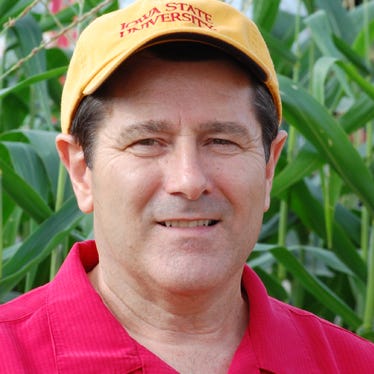May 26, 2017

Iowa State University Extension and Outreach’s annual statewide survey for cash rental rates was released in early May. Average cash rents for tillable acres planted to corn or soybeans are down by 4.8%, or $11 per acre to $219 per tillable acre for 2017. This is the fourth consecutive year that average cash rents have declined in Iowa, accumulating to nearly a 19% drop since 2013. The average 2017 cash rent is still higher than the average rate in 2011.
Detailed results by county and crop are available in Cash Rental Rates for Iowa 2017 Survey, found on the ISU Ag Decision Maker website. There is considerable variability across counties in year-to-year changes, as is typical of survey data. In 2017, 82 counties experienced declines in average cash rents for tillable acres.
Declines in cash rents occurred in eight of the nine crop reporting districts, with the exception of southeast Iowa, which showed a mere $1 per acre increase. The greatest statewide declines were in the northern districts and ranged from $14 to $19 per acre. The survey results also provide typical rents for alfalfa, grass hay, oats, pasture, cornstalk grazing and hunting rights in each county and district.
Use survey results as a reference point
A total of 1,448 survey respondents provided typical cash rental rates in their counties for farmland producing corn and soybeans, as well as hay, oats and pasture. Of these survey respondents, 52% were farmers, 29% landowners, 9% ag lenders, 9% professional farm managers and real estate agents, and 2% were other professions. Since randomization to identify respondents was not used, this is primarily a market value survey.
The 2017 cash rent survey information can serve as a reference point for negotiating an appropriate rental rate for next year. ISU Extension will conduct about 70 farmland leasing meetings statewide during late summer, when determining a fair cash rental rate will be discussed. Rents for individual farms should be based on productivity, ease of farming, fertility, drainage, local price patterns, longevity of the lease arrangement and possible additional services performed by the tenant.
Crop prices, land values key drivers
There are two major factors with the potential to influence future cash rents: crop prices and land values. The corn and soybean cash prices received in Iowa peaked in August 2012 at $7.90 and $16.80 per bushel, respectively. In March 2017, corn and soybean cash prices were $3.40 and $9.60 per bushel, respectively. Thus, cash crop prices have accumulated declines at 57% and 43% from their peak values.

Due to current and projected low crop prices in 2017, barring major weather problems, profit margins for crop production are expected to remain very tight. This is despite record corn and soybean production and yields realized in Iowa each of the past two years. Many farm operators will likely attempt to negotiate lower cash rents to cash-flow their operation for 2018.
The second major factor affecting cash rents is the return on investment for landowners. The average return to landowners who cash-rent their farmland to operators has followed a declining trend since the early 1990s, and it has stabilized at around 3%. This is often referred to as the capitalization rate of Iowa farmland.
Helpful information you can use
Farmland leasing resources for estimating a fair cash rent can be found at ISU AgDecision Maker. These resources to help analyze individual leasing situations include “Computing a Cropland Cash Rental Rate” (C2-20), “Computing a Pasture Rental Rate” (C2-23) and “Flexible Farm Lease Agreements” (C2-21).
Johnson is an Iowa State University Extension farm management specialist. He can be reached at [email protected].
About the Author(s)
You May Also Like






